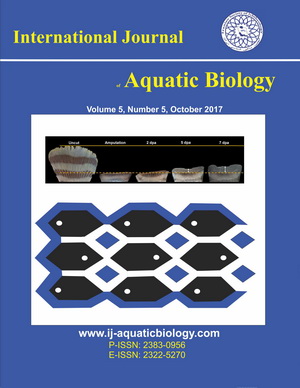Biochemical and physiological effect of dietary supplements of ZnO nanoparticles on common carp (Cyprinus carpio)
Downloads
ZnO-NPs, like other macromolecule sources, may provide the fish with sufficient amounts of zinc and be effective in regulating the biochemical function of cells in organisms. This study aimed to assess the possibility of using nanoparticles in common carp diet by evaluating alterations in blood biochemical parameters, as a clinical marker of fish health. In this study, fish were fed diets supplemented with 0 (control), 5, 10 and 15 mg kg-1 ZnO-NPs for 21 days. The results showed that after 21 days admiration of ZnO-NPs, 10 and 15 mg kg-1 concentrations significantly increased aspartate aminotransferase (AST) activity and glucose, cholesterol, triglyceride and creatinine levels in plasma of fish (P<0.05). Also, the administration of 15 mg kg-1 ZnO-NPs significantly (P<0.05) increased alanine aminotransferase (ALT), Lactate dehydrogenase (LDH) and alkaline phosphatase (ALP) activities. No significant changes were observed in plasma total protein, albumin and globulin levels (P>0.05). In conclusion, the results showed that diets containing high concentrations of ZnO-NPs supplement (10 and 15 mg) is caused severe cytotoxic effects, including changes in blood biochemical parameters. The primary toxic mechanism of ZnO-NPs was possibly increasing the cellular oxidative stress and disrupting the biochemical function of cells.
Downloads
Ahmadi K., Mirvaghefei A.R., Banaee M., Vosoghei, A.R. (2014). Effects of long-term diazinon exposure on some immunological and haematological parameters in rainbow trout Oncorhynchus mykiss (Walbaum, 1792). Toxicology and Environmental Health Sciences, 6(1): 1-7.
Ansari M.A., Khan, H.M., Khan A.A., Alzohairy, M.A. (2015). Biochemical and histopathological ultrastructural changes caused by ZnO nanoparticles in mice. Toxicological and Environmental Chemistry, 97(8): 1025-1040.
Banaee M., Soleimany V., Nematdoost Haghi B. (2017). Therapeutic effects of marshmallow (Althaea officinalis L.) extract on plasma biochemical parameters of common carp infected with Aeromonas hydrophila. Veterinary Research Forum, 8(2): 145-153.
Banaee M., Sureda A., Taheri S., Hedayatzadeh F. (2019). Sub-lethal effects of dimethoate alone and in combination with cadmium on biochemical parameters in freshwater snail, Galba truncatula. Comparative Biochemistry and Physiology Part C: Toxicology and Pharmacology, 220: 62-70.
Beitsayah A., Banaee M., Nematdoost Haghi B. (2019). Effects of OralAdministration of nano zinc oxide on some immunological parameters of common carp (Cyprinus carpio). Journal of Aquatic Ecology, 8(3): Article in press.
Bilandžić N., Sedak M., Äokić M., Varenina I., Solomun Kolanović B., Božić Ä., Brstilo M., Å imić B. (2014) Determination of zinc concentrations in foods of animal origin, fish and shellfish from Croatia and assessment of their contribution to dietary intake, Journal of Food Composition and Analysis, 35(2): 61-66.
Chabosseau P., Rutter G.A. (2016). Zinc and diabetes. Archives of Biochemistry and Biophysics, 611: 79-85.
Chupani L., Niksirat H., Velíšek J., Stará A., Hradilová Å ., KolaÅ™ík J., PanáÄek A., Zusková E. (2018). Chronic dietary toxicity of zinc oxide nanoparticles in common carp (Cyprinus carpio L.): Tissue accumulation and physiological responses. Ecotoxicology and Environmental Safety, 147: 110-116.
Chupani L., Zusková E., Niksirat H., PanáÄek A., Lí¼nsmann V., Haange S.B., von Bergen M., Jehmlich N. (2017). Effects of chronic dietary exposure of zinc oxide nanoparticles on the serum protein profile of juvenile common carp (Cyprinus carpio L.). Ecotoxicology and Environmental Safety, 579: 1504-1511.
Connolly M., Fernández M., Conde E., Torrent F., Navas J.M., Fernández-Cruz M.L. (2016). Tissue distribution of zinc and subtle oxidative stress effects after dietary administration of ZnO nanoparticles to rainbow trout. Science of the Total Environment, 551: 334-343.
Davis D.A., Gatlin D.M. (1996). Dietary mineral requirements of fish and marine crustaceans. Reviews in Fisheries Science, 4(1): 77-99.
Dekani L., Johari S.A., Joo H.S. (2019). Comparative toxicity of organic, inorganic and nanoparticulate zinc following dietary exposure to common carp (Cyprinus carpio). Science of The Total Environment, 565: 1191-1198.
Domínguez D., Robaina L., Zamorano M.J., Karalazos V., Izquierdo M. (2019). Effects of zinc and manganese sources on gilthead seabream (Sparus aurata) fingerlings. Aquaculture, 505: 386-392.
Fazilati M. (2013). Investigation toxicity properties of zinc oxide nanoparticles on liver enzymes in male rat. European Journal of Experimental Biology, 3(1), 97-103.
Foster M., Peter Petocz P., Samman S. (2010). Effects of zinc on plasma lipoprotein cholesterol concentrations in humans: A meta-analysis of randomised controlled trials. Atherosclerosis, 210: 344-352.
Foster-Swanson A., Swartzentruber M., Roberts P. (1994). Refrence interval studies of the rate-blancked creatinine, Jaffe method on BM /Hitachi Systems in Six U.S. Laboratories (Abstract). Clinical Chemistry, 361.
Frassinetti S., Bronzetti G., Caltavuturo L., Cini M., Croce C.D. (2006). The role of zinc in life: a review. The Journal of Environmental Pathology, Toxicology, and Oncology, 25(3): 597-610.
Gharekhani A., Azari Takami G., Tukmechi A., Afsharnasab M., Agh N. (2015). Effect of dietary supplementation with zinc enriched yeast (Saccharomyces cerevisiae) on immunity of rainbow trout (Oncorhynchus mykiss). Iranian Journal of Veterinary Research, 16(3): 278-282.
Hatami M., Banaee M., Nematdoost Haghi B. (2019). Sub-lethal toxicity of chlorpyrifos alone and in combination with polyethylene glycol to common carp (Cyprinus carpio). Chemosphere, 219: 981-988.
Hongfu Y.B.Z. (2008). Effects of Nano-ZnO on growth performance and diarrhea rate in weaning piglets. China Feed, 1: 008.
Johnson A.M., Rohlfs E.M., Silverman L.M. (1999). Proteins. In: C.A. Burtis, E.R. Ashwoo (Eds.). Tietz Textbook of Clinical Chemistry. 3rd ed., Philadelphia: W.B. Saunders Company.
Kumar N., Krishnani K.K., Singh N.P. (2018). Effect of dietary Zinc-nanoparticles on growth performance, anti-Oxidative and immunological status of fish reared under multiple stressors. Biological Trace Element Research, 186(1): 267-278.
Lin T., Jianyang J., Fenghua Z., Huiying R., Wenli L. (2009). Effect of nano-zinc oxide on the production and dressing performance of broiler. Chinese Agricultural Science Bulletin, 02, Category Index: S831.
Ma R., Hou H., Mai K., Bharadwaj A.S., Ji F., Zhang W. (2014). Comparative study on the bioavailability of chelated or inorganic zinc in diets containing tricalcium phosphate and phytate to turbot (Scophthalmus maximus). Aquaculture, 420: 187-192.
Mishra A., Swain R.K., Mishra S.K., Panda N., Sethy, K. (2014). Growth performance and serum biochemical parameters as affected by nano zinc supplementation in layer chicks. Indian Journal of Animal Nutrition, 31(4): 384-388.
Mobasher M., Aramesh K., Aldavoud S., Ashrafganjooei N., Divsalar K., Phillips C., Larijani B. (2008). Proposing a national ethical framework for animal research in Iran. Iranian Journal of Public Health, 37(1): 39-46.
Moss D.V., Henderson A.R. (1999). Clinical enzymology: In: C.A. Burtis, E.R. Ashwoo (Eds.). Tietz Textbook of Clinical Chemistry. 3rd ed., Philadelphia: W.B. Saunders Company.
Musharraf M., Khan M.A. (2019). Dietary zinc requirement of fingerling Indian major carp, Labeo rohita (Hamilton). Aquaculture, 503: 489-498.
Najafzadeh H., Ghoreishi S.M., Mohammadian B., Rahimi E., Afzalzadeh M.R., Kazemivarnamkhasti M. Ganjealidarani H. (2013). Serum biochemical and histopathological changes in liver and kidney in lambs after zinc oxide nanoparticles administration. Veterinary World, 6: 534-537.
Nematdoost Haghi B., Banaee M. (2017). Effects of micro-plastic particles on paraquat toxicity to common carp (Cyprinus carpio): biochemical changes. International Journal of Environmental Science and Technology, 14(3): 521-530.
Olechnowicz J., Tinkov A., Skalny A., Suliburska J. (2018). Zinc status is associated with inflammation, oxidative stress, lipid, and glucose metabolism. Journal of Physiological Sciences, 68(1): 19-31.
Olmedo P., Hernández A.F., Pla A., Femia P., Navas-Acien A., Gil F. (2013). Determination of essential elements (copper, manganese, selenium and zinc) in fish and shellfish samples. Risk and nutritional assessment and mercury-selenium balance. Food and Chemical Toxicology, 62: 299-307.
Rezaei Shadegan M., Banaee M. (2018) 'Effects of dimethoate alone and in combination with Bacilar fertilizer on oxidative stress in common carp, Cyprinus carpio. Chemosphere, 208: 101-107.
Rifai N., Bachorik P.S., Albers J.J. (1999). Lipids, lipoproteins and apolipoproteins. In: C.A. Burtis, E.R. Ashwoo (Eds.). Tietz Textbook of Clinical Chemistry. 3rd ed, Philadelphia: W.B. Saunders Company.
Sacks D.B. (1999). Carbohydrates. In: C.A. Burtis, E.R. Ashwood (Eds.), Tietz Textbook of Clinical Chemistry. 3rd ed, Philadelphia: W.B. Saunders Company.
Sharma V., Singh P., Pandey A.K., Dhawan A. (2012). Induction of oxidative stress, DNA damage and apoptosis in mouse liver after sub-acute oral exposure to zinc oxide nanoparticles. Mutation Research, 745: 84-91.
Sobhanirada S. Naserian A.A. (2012). Effects of high dietary zinc concentration and zinc sources on hematology and biochemistryof blood serum in Holstein dairy cows. Animal Feed Science and Technology, 177: 242-246.
Soleimany V., Banaee M., Mohiseni M., Nematdoost Haghi B., Mousavi Dehmourdi L. (2016). 'Evaluation of pre-clinical safety and toxicology of Althaea officinalis extracts as naturopathic medicine for common carp (Cyprinus carpio). Iranian Journal of Fisheries Sciences,15(2): 613-629.
Suttle N.F. (2010) Mineral nutrition of livestock, 4th edition, Wallingford, UK: CABI Publishing. 587 p.
Swain P.S., Rao S.B.N., Rajendran D., Dominic G., Selvaraju S. (2016). Nano zinc, an alternative to conventional zinc as animal feed supplement: A review. Animal Nutrition, 2(3): 134-141.
Taheri S., Banaee M., Nemadoost Haghi B., Mohiseni M. (2017). Effects of Dietary Supplementation of Zinc Oxide Nanoparticles on Some Biochemical Biomarkers in Common Carp (Cyprinus carpio). International Journal of Aquatic Biology, 5(5): 286-294.
Uriu-Adams J.Y., Keen C.L. (2010). Zinc and reproduction: effects of zinc deficiency on prenatal and early postnatal development. Developmental and Reproductive Toxicology, 89(4): 313-325.
Velazquez-Carriles C., Macias-Rodríguez M.E., Carbajal-Arizaga G.G., Silva-Jara J., Angulo C., Reyes-Becerril M. (2018). Immobilizing yeast β-glucan on zinc-layered hydroxide nanoparticle improves innate immune response in fish leukocytes. Fish & Shelfish Immunology, 82: 504-513.
Wang J., Deng X., Zhang F., Chen D., Ding W. (2014). ZnO nanoparticle-induced oxidative stress triggers apoptosis by activating JNK signaling pathway in cultured primary astrocytes. Nanoscale Research Letters, 9: 117.
Wang K., Wang W.X. (2015). Optimal dietary requirements of zinc in marine medaka Oryzias melastigma: Importance of daily net flux. Aquaculture, 448, 54–62.
Wijesekara N., Chimienti F., Wheeler M.B. (2009). Zinc, a regulator of islet function and glucose homeostasis. Diabetes Obes Metab, 4: 202-214.








